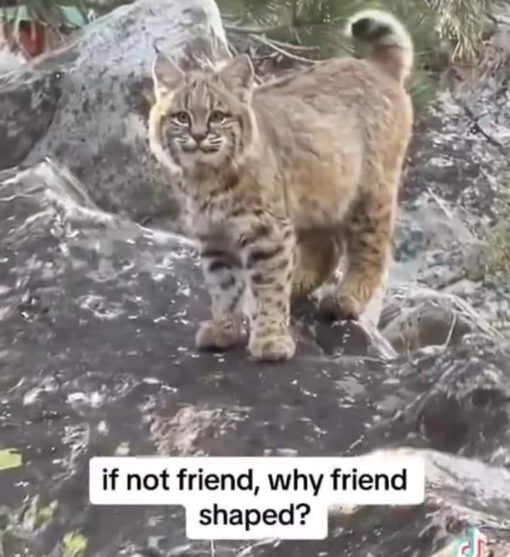if not friend why friend shaped
This image features a wild cat captured in a moment that seems both curious and humorous. The cat stands in a natural environment, most likely somewhere outdoors with visible rocks and perhaps foliage in the background. The cat's expression is intense and focused, typical of a feline, but there is also a slight tilt of the head that could be interpreted as a sense of bewilderment or inquisitiveness, which adds to the comical aura of the picture.
What truly contributes to the humor of the image is the caption overlaid at the bottom which reads "if not friend, why friend shaped?" This caption seems to be a cheeky anthropomorphic interpretation of the cat's thoughts, suggesting that it is confused by something or someone that looks like a friend but isn't behaving like one. This type of caption is common on the internet, where animal photos are often paired with human-like thoughts that play on the situation depicted.
The text is deliberately written in a whimsical, incorrect form of English, using "friend shaped" as a humorous concept. This style of writing mimics internet "meme-speak," a type of language that is common in online culture. It is characterized by intentional misspellings, a casual approach to grammar, and a tone that conveys naivety or childlike wonder, which often makes it more relatable and entertaining.
The humor also comes from the incongruity between the solemn, wild appearance of the cat and the lighthearted, silly text suggesting a depth of thought and emotion not usually attributed to animals. This juxtaposition creates a sort of cognitive dissonance that is often the root of visual comedic effect, as our brains reconcile the noble image of the wildcat with the anthropomorphic silliness.
This picture might strike people as funny because it plays on the human tendency to attribute human characteristics to animals, also known as anthropomorphism. The discrepancy between the cat's wild appearance and the humorous suggestion that it's capable of contemplative questioning about the nature of friendship provokes amusement. The caption implies a level of social reflection that is amusingly unlike what one would expect from a feral creature.
Lastly, "if not friend, why friend shaped?" sounds like a philosophical musing that would be at home among age-old existential questions, yet it's being attributed to a cat in a mundane outdoor setting. People may find comedy in this grandiose line of questioning applied to what might be a straightforward case of animal confusion or curiosity, showcasing how humor can emerge from placing ordinary occurrences in absurdly overthought contexts. if not friend why friend shaped
